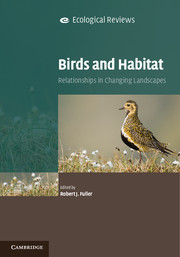Book contents
- Frontmatter
- Contents
- List of Contributors
- Preface
- Part I The complexity of patterns and processes
- Chapter One The bird and its habitat: an overview of concepts
- Chapter Two Habitat quality and habitat occupancy by birds in variable environments
- Chapter Three Spatial variation and temporal shifts in habitat use by birds at the European scale
- Chapter Four Mechanisms and processes underlying landscape structure effects on bird populations
- Chapter Five Avian responses to transitional habitats in temperate cultural landscapes: woodland edges and young-growth
- Chapter Six Habitat associations of birds in complex changing cultural landscapes
- Chapter Seven The importance of habitat heterogeneity at multiple scales for birds in European agricultural landscapes
- Part II Case studies of habitat use and selection
- Part III Wider perspectives
- Species index
- Subject index
- References
Chapter Three - Spatial variation and temporal shifts in habitat use by birds at the European scale
Published online by Cambridge University Press: 05 December 2012
- Frontmatter
- Contents
- List of Contributors
- Preface
- Part I The complexity of patterns and processes
- Chapter One The bird and its habitat: an overview of concepts
- Chapter Two Habitat quality and habitat occupancy by birds in variable environments
- Chapter Three Spatial variation and temporal shifts in habitat use by birds at the European scale
- Chapter Four Mechanisms and processes underlying landscape structure effects on bird populations
- Chapter Five Avian responses to transitional habitats in temperate cultural landscapes: woodland edges and young-growth
- Chapter Six Habitat associations of birds in complex changing cultural landscapes
- Chapter Seven The importance of habitat heterogeneity at multiple scales for birds in European agricultural landscapes
- Part II Case studies of habitat use and selection
- Part III Wider perspectives
- Species index
- Subject index
- References
Summary
Relationships between birds and habitat can be very tight. Without prior local knowledge, experienced birdwatchers often correctly predict occurrence of individual bird species in a given place, just on seeing the physiognomy of the landscape. The strong coupling of habitats and birds is widely used in different applications. These include mapping bird distribution in areas with no bird records using habitat features as proxies (Franco et al., 2009), developing habitat management plans aimed at species conservation (e.g. Gilbert et al., 2005; Wilson et al., 2005), predicting future changes in distribution following climate change (von dem Bussche et al., 2008), as well as in the reconstruction of prehistoric environmental conditions and ancient bird distributions (Tomek et al., 2003; Yalden and Albarella, 2008). Bird–habitat relationships measured in one area, region or time period are frequently taken as representative for a given species, something of an invariable species-specific trait. Taking this for granted is rather puzzling, as we should rather expect the opposite to be true, namely that bird–habitat links have evolved, i.e. they changed through time and will continue to do so. Similarly, one might expect that, to adjust to contrasting conditions in different parts of their range, species would develop spatially varying habitat associations. This idea is not new (Svärdson, 1949; Mayr, 1963; Hildén, 1965), but until recently it has remained largely neglected. A growing number of quantitative studies, both in Europe and North America, indicate that spatial variation in avian habitat associations is widespread. However, with the exception of Fuller’s (2002) preliminary analysis for forest birds, we are unaware of any recent overview of geographical variation in habitat use by birds at either the European or North American scales.
- Type
- Chapter
- Information
- Birds and HabitatRelationships in Changing Landscapes, pp. 63 - 92Publisher: Cambridge University PressPrint publication year: 2012
References
- 14
- Cited by

